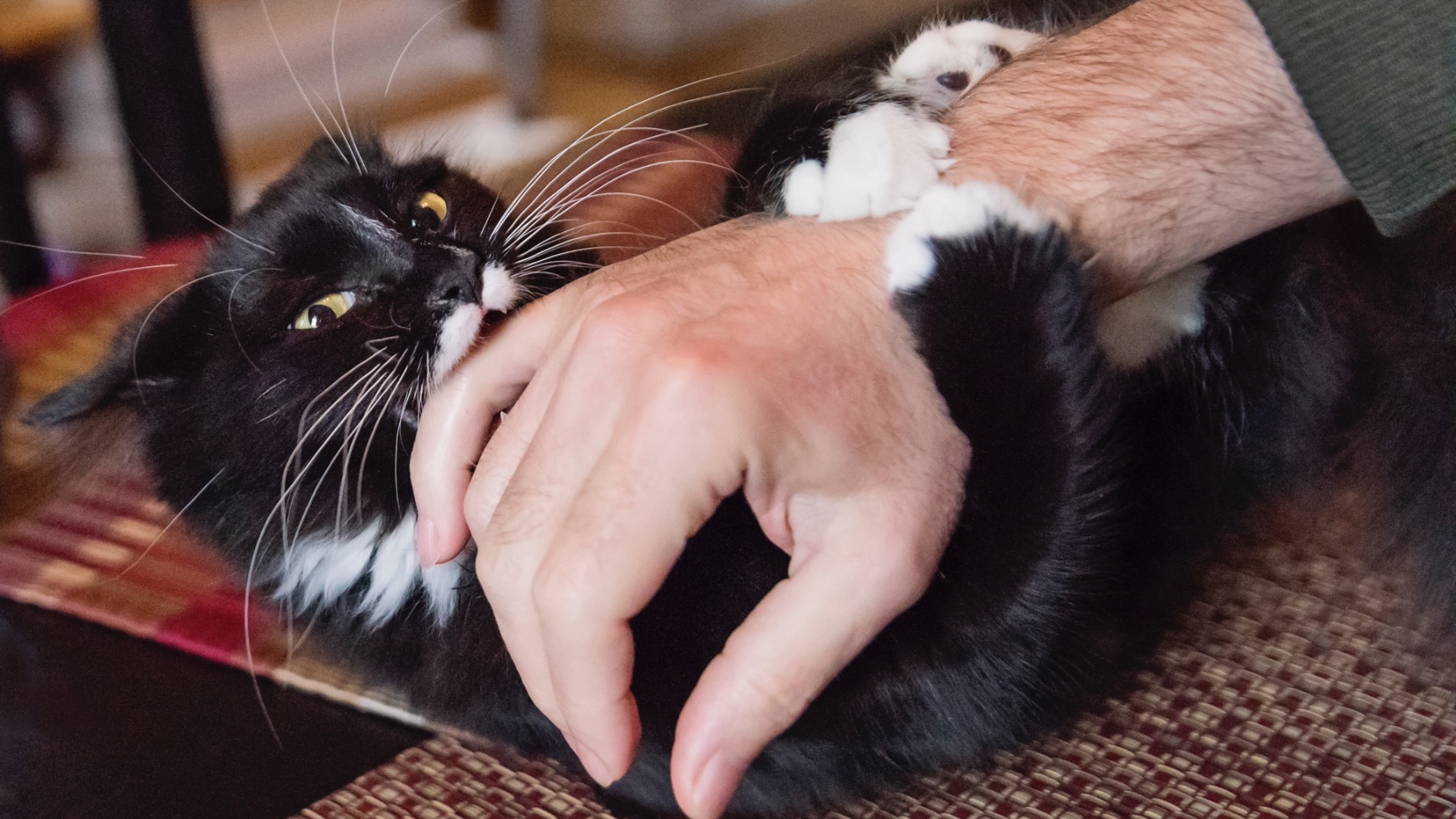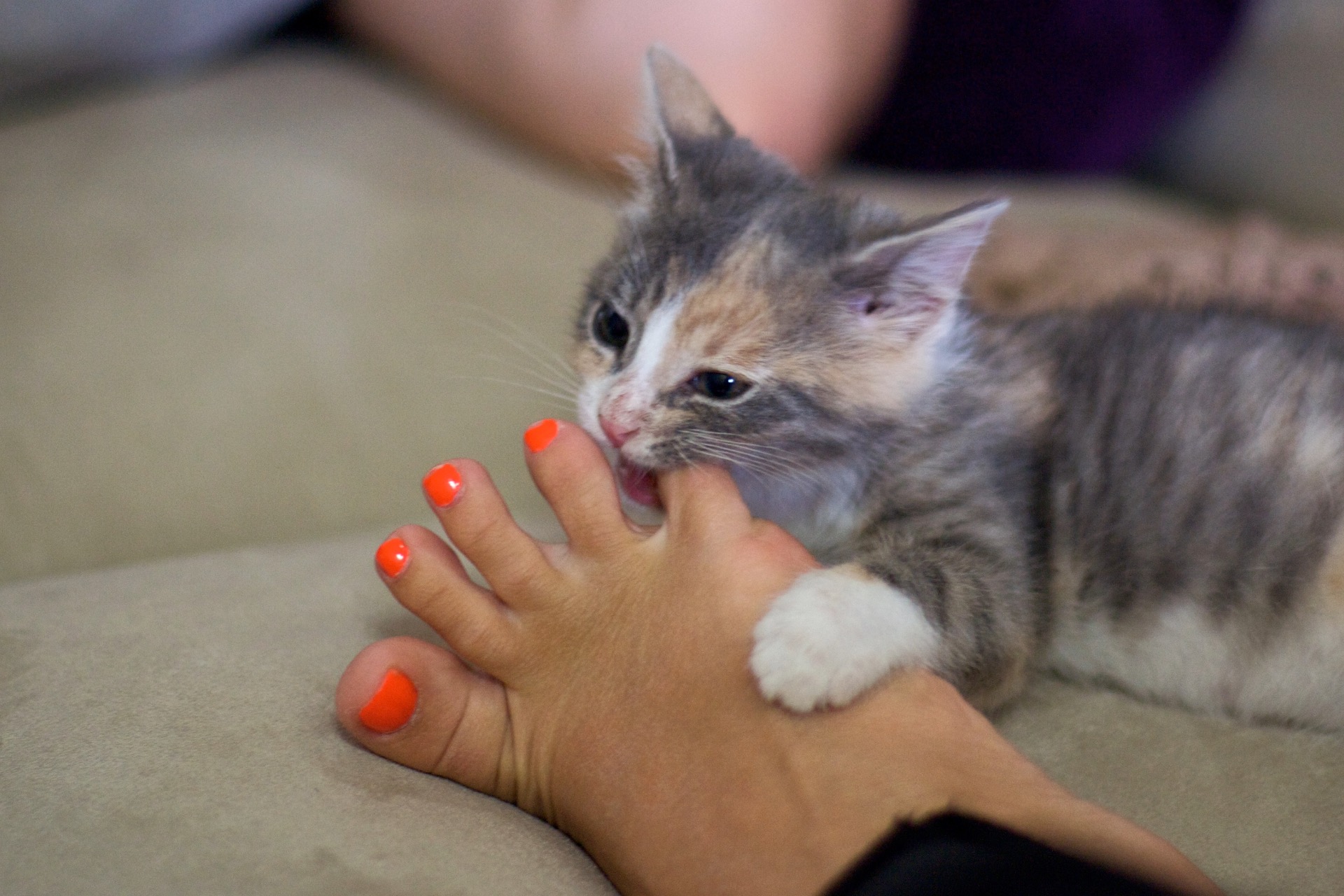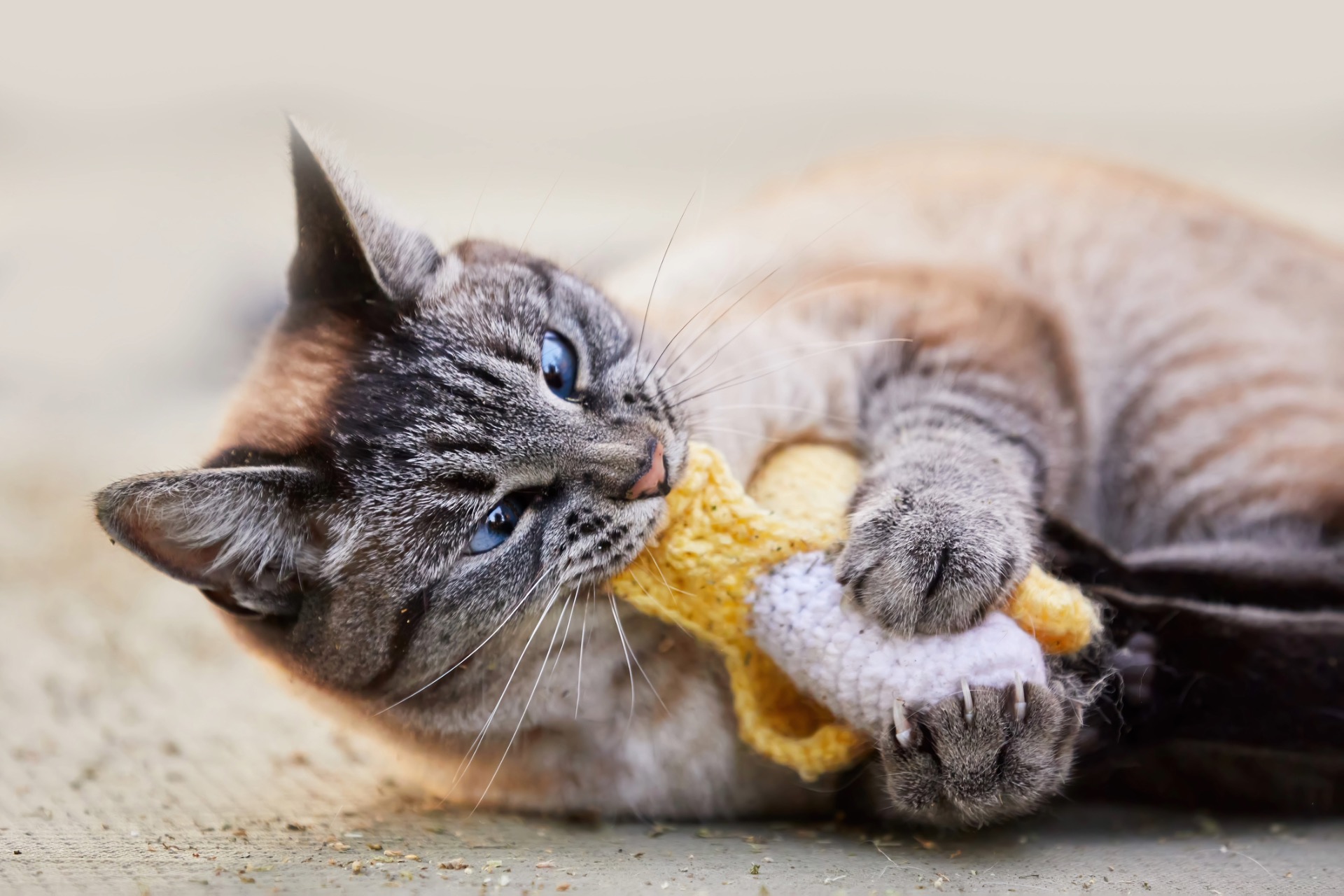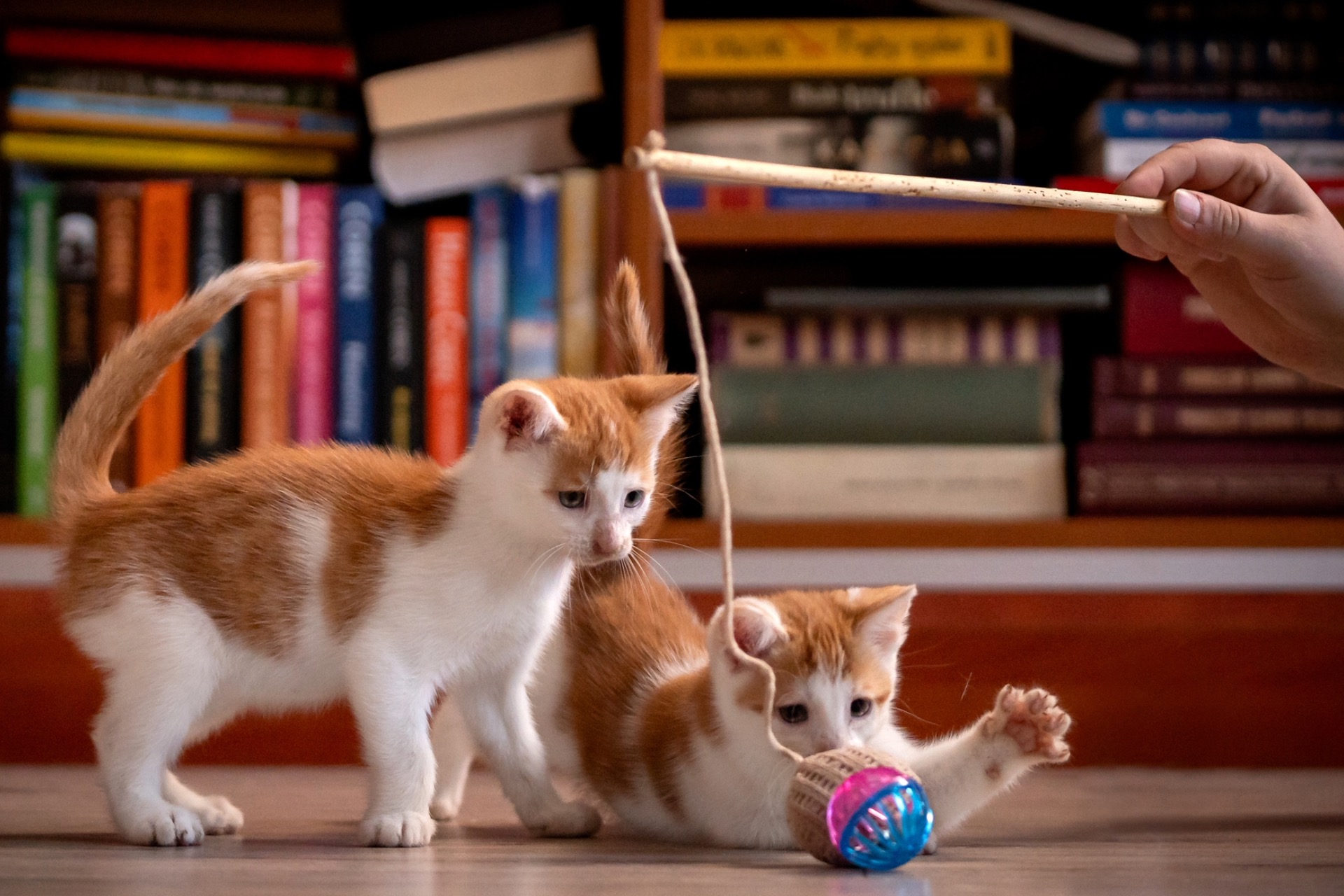
Cat play biting can come as a shock. One minute playtime with your furry friend is all fun and games, then they suddenly give you a painful nip.
Perhaps you have a multi-cat household and are concerned that your cats are playing too roughly and biting each other. Even if you’ve given them the best cat toys, it’s common for cats to occasionally give their human companions or feline playmates a playful nibble, but play biting can escalate and cause injuries if their teeth break the skin, so it’s important to discourage this behavior.
Play biting can be influenced by three key factors - a cat’s natural hunting instincts, their early socialization experiences, and a need to communicate with their human or feline playmate.
We asked Amanda Campion, a clinical animal behaviorist, to explain these underlying motivations and advise us how to respond to play bites or better yet, deter your kitty from displaying this undesirable behavior.
She has worked with cats and their caregivers for many years, using her detective skills to find out what their problems are and trying to find a balance where life is harmonious again for cats and humans.
Why is my cat play biting?
Have you ever received an unexpected bite during playtime with your furry friend and found yourself wondering why does my cat bite me? Cats don’t bite just for the sake of biting. It’s a natural part of your feline friend’s behavioral repertoire.
Campion explains, “A cat’s bite is innate and instinctual predatory behavior. As kittens, they practice their hunting skills, honing their reflexes and satisfying their natural urge to chase moving objects, catch and bite prey.”
You may have experienced your kitty attempting to hug, bunny kick and bite your forearm or leg. This is how they would restrain and immobilize prey. If your cat doesn’t have enough opportunities to simulate the hunting sequence of stalk, chase, pounce, kick, scratch and bite by playing with toys or puzzle feeders, they may misdirect predatory behavior towards you or their feline playmates.
Kittens usually learn social skills, boundaries, and self-control through playing with their siblings and mother. Their playmate will yelp, bat them on the nose, or stop playing with them if they bite too hard.

If a kitten is taken away from its litter too soon or has to be hand-reared alone, it may not learn to sheath its claws and inhibit its bite, leading to overly aggressive play behaviors in adulthood.
Cats also use biting as a form of communication and social interaction. Campion explains, “Play biting is also a means for cats to communicate their personal boundaries or seek attention. By gently nipping another cat or human, they may be indicating their comfort levels or trying to initiate interaction. As soon as the other cat or human responds to the nip, the cat quickly learns this is effective to get the attention it sought.”
When cats play together, gentle nips are often used to encourage a feline playmate to join the game, but a bite may also signal that play is getting too rough and the biter has had enough. If your kitty nips your body parts during play, they're probably in a heightened state of arousal.
Campion cautions, “When a cat becomes overstimulated during play, they may resort to biting to release pent-up energy or express frustration. It’s crucial to recognize their subtle cues and intervene or conclude the interaction before play escalates to aggression.”
How to stop a cat play biting you
To prevent cat play aggression it’s important to understand how to play with a cat appropriately. Never engage in play that involves roughhousing or teasing your feline friend with your hands or feet.
Campion warns, “Hands-free play is essential to prevent your kitten or cat from associating hands or feet as toys."
Encouraging them to pounce by wriggling your fingers or toes under a blanket may seem like a fun game, but this teaches them that it’s acceptable to ambush and attack human body parts, which can lead to misdirected predatory behavior.
While nips from a kitten may be cute, it’s not so amusing when they grow up and have sharper teeth and a much stronger bite.
“Very often, inappropriate human play with kittens will develop into unwanted aggressive tendencies as they mature into adulthood,” explains Campion.
She continues: “Appropriate play is a crucial factor in reducing the likelihood of play biting directed at caregivers and helps establish healthy boundaries and positive play habits. Providing outlets for predatory play, such as wand toys and puzzle feeders, offers your cat opportunities to engage in natural predatory and foraging behaviors in a safe and stimulating environment. It helps satisfy their hunting instincts and prevents boredom-induced biting by utilizing their time effectively.”
Keeping an eye on cat body language can help you spot the warning signs that your feline friend is becoming over-stimulated or frustrated.

“Understanding your cat’s body language is key to preventing play biting,” says Campion. “Always pay attention to their micro-facial and body signals, such as dilated pupils, rippling skin, twitching tail, or flattened ears, which may indicate agitation or overstimulation during play.”
Campion advises, “To deter play biting, immediately withdraw your attention and focus from the cat or kitten and shift your body position away. If your cat already has a grip on your hand, let your limb go floppy and still, then wait for the cat to unlatch. When this happens swiftly remove yourself from the cat without eye contact or communication, preferably to another room.”
If you believe that your furry playmate is about to bite, redirecting their attention to an appropriate kicker toy will allow them to engage their natural predatory instincts to grab, kick, and bite without causing you any injuries.
Campion cautions, “The timing of this is crucial as if you give them the toy after they have bitten you, they may perceive that the biting results in the reward of play with a toy. Consistently reinforcing gentle play behavior with positive reinforcement and redirecting your cat to appropriate toys can help to discourage play biting in the future.”
How to stop a cat play biting other cats
It can be difficult to determine are my cats playing or fighting? The pouncing, wrestling, bunny kicking and biting behaviors displayed by cats during play look very similar to those seen during aggressive encounters. But there are clues you can look out for.
Play fighting is less intense than true fighting, doesn’t involve any hissing or growling and playmates tend to take turns ambushing and pouncing on each other, whereas during an aggressive interaction, it’s usually obvious that one cat is the aggressor and the other the victim.
Cats, particularly kittens, often use their mouths to interact with each other during play sessions. These playful nips are usually gentle and not intended to cause harm.
However, there is a risk that play biting can escalate into aggression, particularly if one cat decides that they’ve had enough, but their playmate continues trying to ambush or wrestle them.
Cats are individuals with unique personalities and preferences. Some enjoy and have a high tolerance for rough play, while others are more sensitive and may find over-exuberant play and biting stressful.
This is more likely to occur when there’s a mismatch between the cats’ temperaments and activity levels, for example, kittens tend to be very active and have higher play drives than adult cats.
If one of your cats has much more energy than their companion, engage them in play with the the best interactive cat toys to give their feline playmate a break.

Never punish your cat if they play too roughly or play bite another cat, as this can cause stress and anxiety.
“Punishing a cat will only exacerbate tensions and can cause the relationship between cats to deteriorate, as well as damaging the human/cat bond,” cautions Campion. "Discourage play biting and aggressive play by ensuring the environment has ample resources and space to avoid competition and resource guarding. Try to engage your cats in favorable interactions through individual playtime and enrichment activities tailored to each cat’s age-specific and health needs.”
You might be wondering can you train a cat to deter play biting and the answer is yes! Positive reinforcement training using praise and treats to reward gentle play behavior can help to foster harmony between two cats and encourage positive play interactions.
They have a reputation for being lazy and aloof but are cats playful? We reveal the importance and benefits of cat play, from banishing boredom to strengthening the cat-human bond.







